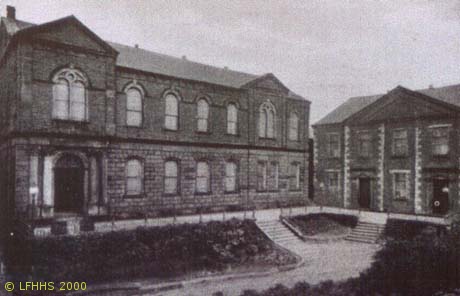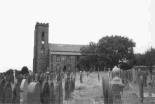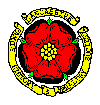
Lanehead Lane Bacup
In 1692 a plot of land was purchased from Mr. John Whitaker of Broadclough and a place was built on what is now the site of Bacup Library for use firstly as a school and secondly as a place to pray, preach and worship by Protestant Dissenters, such as the cousins William Mitchell and David Crosley who hailed from Heptonstall in Yorkshire. It was here that the dissenters of Rossendale became organised into a distinct church and by 1710 had adopted definite Baptist principles.
Mitchell and Crosley were itinerant preachers who covered the area between Bradford and Rossendale. When William Mitchell died in 1705 David Crosley continued his wanderings until approximately 1722 when he settled as the pastor at Bacup and stayed there until his death in 1744. On Crosley's death there was dissent between supporters of Henry Lord and those of Joseph Piccop as to who should take over. The Lord party stayed on in the old meeting house and in 1746 Joseph Piccop and friends built a new meeting house at Lane Head Lane. After a few years Henry Lord departed from the scene and his follows became reconciled under Joseph Piccop.
Joseph Piccop was a farm labourer from Loveclough and journeyed to Bacup as the occasion required. When Joseph Piccop died in 1772 he left the church in a weak state. Fortunately the church was soon able to appoint John Hirst of the Baptist Church Accrington in 1773. By 1777 Rev Hirst had substantially increased the congregation and built a larger meeting house at the cost of £400. By 1810 more room was needed and a new chapel was built in 1812.
John Hirst died in 1815 after 42 years as minister and was succeeded by Rev. W. J. Dyer. In 1821 Rev. Dyer and approximately half the members split over pastoral differences and formed a second church which later on became Irwell Terrace Church.
After Rev. Dyer departed things quietened down for the next thirty years. During the ministry of Rev. Grant a new school was built and an additional classroom was added in 1849 under Rev. Jonas Smith, and a Sunday Scholl was opened at Millgate. In 1858 a new chapel was built at Millgate at the cost of £1100 with Millgate becoming a separate church. In 1861 a Sunday School was started at Deerplay and in 1862 a chapel was built at Doals, which became a separate church in 1867.
In 1864 the roof of Ebenezer became unsafe and worship was held in the Co-operative Hall for the next 20 months until the building of a new chapel in 1870 at a cost of £6,000, with the debt being paid of within 2 months of opening.
In 1874 the troubles started once more when Rev. Smith and a few members of the church split away and eventually formed the Mount Olivet church.
The Rev. F Overend, who served for 37 years (1884 - 1921), was the minister in 1910 when the church celebrated it's bi-centenary and there where nearly 300 members and 460 Sunday School scholars at this time.
By the late 1930s the church was in need of major repair which with falling attendances put a strain on the finances and it was decided in 1941 to dispense with the services of Rev. Brindley. Though new ministers were appointed after the war the church continued to decline. The last service was held on 28th October 1962. The land and buildings were sold to Bacup Corporation and though the building was sound and in good repair the Corporation could find no use for it and so it was demolished and the grave stones laid on the Lanehead Lane boundary.
The Ministers of Ebenezer Church
| W. Mitchell | 1692 - 1705 | |
| D. Crosley | 1722 - 1744 | |
| H. Lord | 1745 - 1746 | |
| J. Piccop | 1746 - 1772 | |
| J. Hirst | 1773 - 1815 | |
| Rev. | W. J. Dyer | 1816 - 1822 |
| Rev. | G. A. Grant | 1822 - 1830 |
| Rev. | J. Edwards | 1831 - 1843 |
| Rev. | S. Todd | 1843 - 1848 |
| Rev. | J. Smith | 1848 - 1874 |
| Rev. | W. Gay | 1878 - 1882 |
| Rev. | F. Overend | 1884 - 1921 |
| Rev. | F. J. Peach | 1926 - 1930 |
| Rev. | H. Brindley | 1933 - 1941 |
| Rev. | G. M. Williams | 1946 - 1953 |
| Rev. | H. Turton | 1959 - 1962 |




